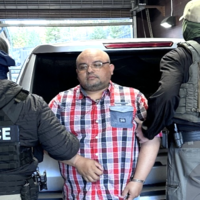ATLANTA (CN) -Two well-known comedians and actors, Eric Andre and Clayton English, asked a federal appeals court Friday to restore their civil rights action against Clayton County and its police officers.
The two Black men claim they were racially profiled and illegally stopped in nearly identical situations several months apart while attempting to board their flights from Atlanta to Los Angeles in 2020 and 2021.
After both men had already gone through security and scanned their boarding passes, Clayton County police officers approached them and cut off their path while they were waiting inside the narrow jet bridge tunnel to board the plane.
The officers took their IDs and boarding passes, questioned them about carrying any illegal drugs and even searched English's carry-on luggage. Neither man was found to have committed any crime nor engaged in any suspicious activity.
Attorney Barry Friedman from the Policing Project at New York University School of Law told the 11th Circuit panel that these unreasonable jet bridge stops and seizures violate Fourth and 14th Amendment rights.
While Clayton County asserts these stops are random and consensual, Friedman argued they are neither. Individuals at Hartsfield-Jackson Atlanta International Airport are stopped disproportionately based on race and the interdictions rely on coercion, Friedman told the court.
"I don't see anything of discriminatory intent by the individual officers in your amended complaint," said U.S. Circuit Judge Elizabeth Branch, a Donald Trump appointee. "Does that doom your claims against the individual officers?"
Friedman argued the officers knew they were singling out individuals based on their race because they were provided weekly logs recording the flight information, names, dates of birth, race and gender of the passengers they stop.
Much of Andre and English's claims rely on precedent from a 1982 case, United States v. Berry, in which the court determined an intrusive airport stop qualifies as a seizure if a reasonable person would have believed they were not free to leave.
"In an airport environment post-9/11, would any passenger stopped by TSA or a police officer know they are free to leave unless they are told?" Branch questioned.
Bill Clinton-appointed U.S. Circuit Judge Frank Hull wondered how to determine when an individual's ticket is retained "for more than a minimum amount of time."
Branch also expressed concern with not upholding the Supreme Court precedent cited in the lower court's order tossing the complaint in 2023. In U.S. v. Drayton, the justices found that no illegal seizure occurred when officers entered a crowded bus, questioned passengers and requested to search their bags, because there was no show of force or intimidation.
Clayton County's attorney, Elissa Haynes, argued the passengers in that case narrowly restricted their own movement by choosing to take the bus, just as Andre and English did when choosing to fly.
"The district court said the statistical data was insufficient to show discriminatory purposes but the complaint says they selected their targets based on race," said U.S. Circuit Judge Jill Pryor, a Barack Obama appointee. "How is that not enough to show discriminatory intent?"
Haynes said the complaint failed to show any comparison of how white passengers were treated differently when stopped and that the individual officers are also shielded by qualified immunity.
According to Andre and English's 2022 complaint, from September 2020 through April 2021, Clayton County police conducted 378 passenger interdictions in jet bridges where department records list the race of the passenger stopped. Of those, 211 passengers or 56% were Black, while only 8% of American domestic air travelers are Black.
Andre and English contend that no more than 39 Black passengers should have been stopped if the stops were truly random.
With regard to drugs, they say records further show that over the eight-month span in which Andre and English were stopped, officers found fewer than 36 grams of illegal drugs, plus six prescription pills with no valid prescription.
Their complaint also discusses two other incidents in which Black men were intercepted by Clayton County officers at the Atlanta Airport without reasonable suspicion of wrongdoing.
"The interdiction of Jean Elie in 2019 and the similar interdiction of Preston Lewis in 2017 illustrate the routine and longstanding nature of these customs and/or polices and demonstrate that Clayton County Police Department, its supervisors, and its officers had long been on notice that the program violated the constitutional rights of passengers," Andre and English wrote.
The three-judge circuit panel did not signal when it will issue a ruling.
Source: Courthouse News Service






































